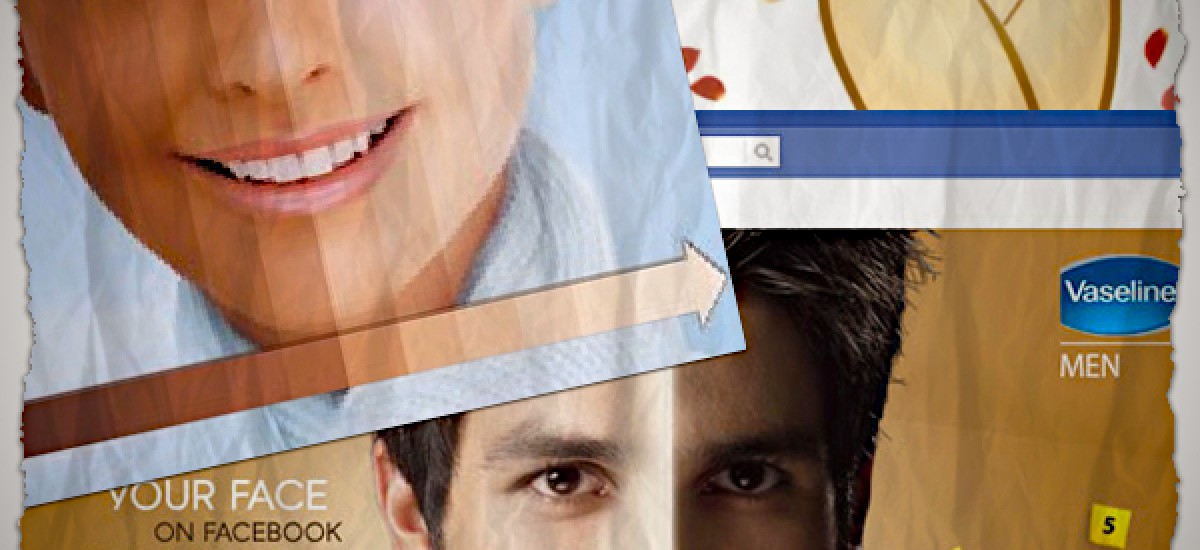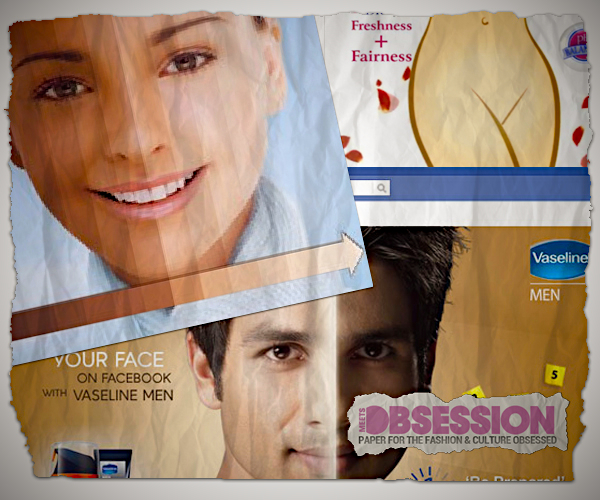Top left to bottom: Advertisements for Fair & Lovely, Clean and Dry Intimate Wash and Vaseline’s Fair & Handsome, from Meets Obsession
Recently, a close member in my family gave birth to a beautiful boy. I have yet to visit her, but I have seen a picture of the tiny infant. He is adorable. Although, we must all admit that newborns are quite odd-looking with their squishy faces, slightly flattened head, and half-opened eyes that seem too large for their faces. But gazing at the picture, I could see my mother in the corner of my eye, waiting for a chance to comment on something that I had not picked up when looking at the photograph – the colour of his skin.
This angered me. Not surprisingly, I must say as this is just one of those random moments where I remain completely baffled by the way my family thinks. She went on about how my family members, including the mother and grandmother of the baby left the infant alone in the crib. No one was cradling him, no one was going “awww” over him, no one was touching him – all because of the colour of his skin. But what really infuriated me were my mother’s comments. “It’s the first time in our family such a kalu child is born. Everyone was shocked. But the shock will wear off after a day. Then, they will carry the baby”, she said. After I told her that I doubt that’s the reason, considering the colour of the mother, who is considerably tan, she replied “That’s tan no. The baby is really kalu.” She claimed that her statements were based on what people think, and not hers. I let it go, without delving further. But then the next day came and I found out exactly who my mother was. I came across some messages which were sent to my sister abroad. The only thing my mother could think of, to describe the infant was…
“The baby is dark”.
The conversation went on to describe how apathetic they felt to the child because he was “so dark” along with the words “sin no” repeated countless times. When questioned, my mother simply said she was being “realistic, this is how the world is, this is how people think”. Of course I knew this. I even knew that few members of my extended family seemed to think that fair people were prettier than darker people. But these were infants, newborns, babies. Surely, one cannot think such a way?
I am saddened and embarrassed to see this side of my family, to know that people who raised me, people who I’ve grown up with, believe that fair equals pretty and dark is ugly. It is surprising to know that even my sisters think such a way, after years of exposure on effects of discrimination from movies, Youtube clips, newspapers articles and television.
I fail to understand how people, never-mind the older generation, but people in their 20s who are educated and have come to a realization that some parts of yesteryears culture are incredibly unreasonable still think this way? Why is it that dark-skin is not considered beautiful?
But wait a minute.. isn’t there a remedy to this already? Cue the ever-present miraculous tubes of ‘Fair & Lovely’, with commercials that display that side effects of fairer skin include the appearance of one’s true love, increased job prospects, and indubitably gaining the love of one’s own parents, something only ‘Fair & Lovely’ would have you believe is impossible for darker children to gain.
I’m sure you have all seen the self-deprecating advertisements of fairness creams. The instances are laughable, the context is absurd, and the message, although constantly surprising that the human mind can stoop to such levels, is preposterous. From commercials that depict “You’re so dark, you’ll never get married” to print advertisements that portray “My husband loves me more because I am much fairer now” (here’s looking at you Ponds), the marketing approach of fairness products seem to have affected the way people think. It has seemingly introduced a new set of values to our culture, based on the notion that being fair makes you an object of desire which means people will flock around you like moths to a flame. It has been established as a prerequisite for success in both the personal and professional front, heightening the natural anxiety of men and women and their ability remain comfortable in their own skin. No matter how bizarre the story line is, there seems to be no better way to market a product than to feed on pointless cultural views and human insecurities.
This year a new phenomenon was introduced, which truly, in my personal opinion, heightened the concept of fairness creams to a whole new level. It seems that society has found yet another reason to hate your body, which means another opportunity for women to make themselves more attractive to the opposite sex. Turns out that the colour of your lady parts is extremely revolting to our society, so here lies the perfect remedy, an Indian product called Clean and Dry Intimate Wash. Check out the commercial here.
As you can see, it is not simply enough to make people feel bad that they are dark, but now everyone has to be insecure about the natural colour of their lady parts. I was doing some research on this matter and came across a rather hilarious comment by an Indian advertising executive. Here is what he had to say about fairness creams.
“It is hard to deny that fairness creams often get social commentators and activists all worked up. What they should do is take a deep breath and think again. Lipstick is used to make your lips redder, fairness cream is used to make you fairer—so what’s the problem? I don’t think any Youngistani today thinks the British Raj/White man is superior to us Brown folk. That’s all 1947 thinking!
The only reason I can offer for why people like fairness, is this: if you have two beautiful girls, one of them fair and the other dark, you see the fair girl’s features more clearly. This is because her complexion reflects more light. I found this amazing difference when I directed Kabir Bedi, who is very fair and had to wear dark make-up for Othello, the Black hero of the play. I found I had to have a special spotlight following Kabir around the stage because otherwise the audience could not see his expressions.
When you have experience like I have—about 50 years in advertising and more in theatre—then you realise that a lot of people don’t talk out of experience, they talk out of book knowledge. They say, “Oh my God, fairness creams… are they saying that Indians are not as good as Europeans?” It’s nothing to do with that.”
Read more here. So how did we get here?
The colonial legacy in our country is one of the main contributory factors for the belief that fair is powerful, fair is beautiful. The white race subjugating the darker race has been stressed in history, which has established an invisible system where the fairer people are those who are successful, powerful, rich, while the darker people are poor, unsuccessful and powerless. Herein lies the cultural view of fair skin considered as a social marker for high class while dark skin is considered as a social marker for low class while being associated with labour or field work. This has given considerable impetus to the notion of superiority of fairness.
Then, of course lies the American and Indian influences, which has caught the imagination of the masses with its yearly production of celebrities, movies and television shows. Our tele-dramas are often filled with women, who put on layers of make-up to appear fair. A walk down the street, and you will see that such thinking has affected people in all levels of the social ladder, wearing such heavy make-up that it appears similar to a face mask. Matrimonial columns is another depiction of colourism, revealing the influence of a person’s skin colour on marketability to marriage partners. In recent times, it has become clear that men too deal with instances of colourism, heightened by an increasing number of male fairness creams launched in the market today. Check this video here.
Personally, as a Sri Lankan woman with the ability to tan deep brown quite easily, the few occasions I have ever felt uncomfortable with my skin colour has been as a result of people of my own race and not as a result of growing up in a predominantly white country, as anyone would probably expect. This was during my schooling years, when I used to play netball almost every day. An aunt greeted me with a “My… you have got so dark. I remember when you were little. You were so fair”; all this with a tone that meant I had once possessed the fair complexion that is so passionately prized by South Asian communities and now, since I was tan, I was no longer pretty in her eyes.
This needs to change. I am tired of people being judged because of the colour of their skin, which quite frankly, they had no control over. I am tired of people making others feel ashamed because they are dark, to feel burdened by how they look, to feel degraded for their physical attributes.
If darker people do not see people who look like them being regarded as beautiful, this attitude will always remain the same. If they do not receive any positive reinforcements about their skin tone, they will always turn to fairness creams in a desperate need to be accepted by society.


